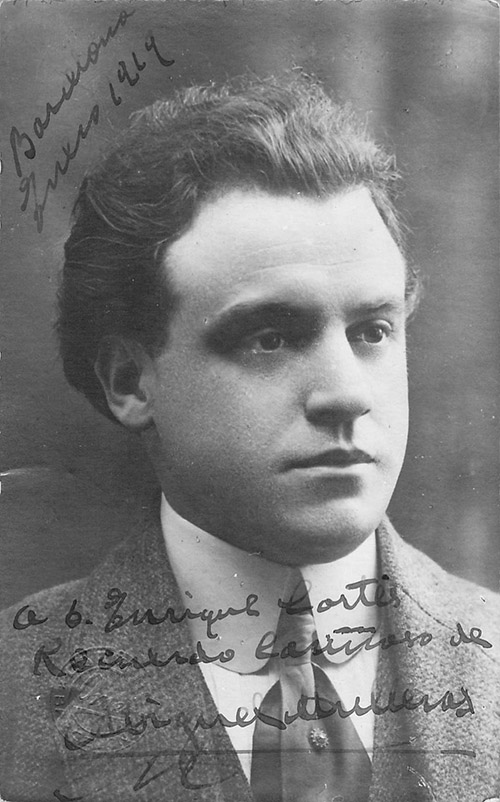Miquel Mulleras
9 March 1883 Barcelona – 1 May 1972 Barcelona
In RA format
Mulleras was a printer in Barcelona, and took voice lessons in his spare time. From 1903, he appeared in
public as a tenor, in concerts and at private parties, without however giving up his bread-and-butter-job at the print shop. He only dared so in
1907, after getting a contract to sing opera at the Teatro Pizarro in Valencia, where he made his debut as Rodolfo on 23 June, and further sang
Don José and Lohengrin.
Upon return to Barcelona, he made another debut as Rodolfo, on 17 November at the Teatre Tívoli. He was a notable success, and sang again
at the Tívoli in 1908: Rodolfo, Cavaradossi, Fernand. The audience regularly demanded, and got, encores from him. In autumn, he toured
several cities: Santander, Oviedo, Gijón; and Valencia again, this time at the Teatro Principal, where he sang Duca, Rodolfo, Fernand and
Cavaradossi.
From 1909 to 1911, he appeared every year at the Coliseo dos Recreios in Lisbon. There, he italianized his first name to Michele (he would also
do that when later singing in Italy), and added new roles to his repertory: Pinkerton, Alfredo, Edgardo. In early 1911, he was at the Principal
in Valencia again, this time also as Gounod's Faust and as Enzo Grimaldo. In Barcelona, he sang at the Teatre Masini and the Teatre Prado
Catalán de Gracia that year (among others, Barbiere and Sonnambula with Graziella Pareto).
In 1912, he appeared in Alexandria, Egypt, as Pinkerton, and in 1913, he was at the Coliseo dos Recreios for another season (Cavaradossi, Rodolfo,
Enzo Grimaldo, Pinkerton, Faust, Edgardo, Turiddu and Lohengrin). He also sang in Porto at the Teatro Eden (where he added Loris to his
repertory). Fall 1913 was spent in Barcelona, at the Novedades and the Tívoli; on 4 November, he made his (not very successful) debut at
the Teatro de la Zarzuela in Madrid (as Duca), and merely three days later, his all but unexpected debut at the Teatre del Liceu in Barcelona,
stepping in as Turiddu for an indisposed colleague at the very last moment – the performance was about to begin, and Mulleras was in the
audience when the management asked him to take over. Then he returned to the Teatro de la Zarzuela for La traviata, and this time, he
scored a triumph.
In 1914, he was at the Coliseo dos Recreios again (for Lohengrin and Boito's Faust), and joined the troupe of the Teatro Circo in Madrid; in
1915, he sang an entire season at the Principal in Valencia, and then became a member of the new opera company at Madrid's Magic Park. He
continued to commute between Barcelona and Madrid, singing at various theaters in both cities; at the Teatro Real in Madrid, he appeared only on
one evening, on 7 February 1916 as Alfredo. On 19 February, he stepped in once more at the Liceu (as Pinkerton), and this time, it earned him a
permanent contract that started in December 1917 with Gounod's Faust. He continued, however, to appear at other theaters in Barcelona, as
well, for instance at the Apolo, and particularly at the Bosque. In 1919, he sang a whole season in Gerona (Fernand, Alfredo, Duca, Enzo Grimaldo,
Canio).
In 1922, he decided to go abroad. First, he sang Canio in Alexandria, then he toured Cuba and Mexico, and from late 1922, he lived in Italy for the
next nine years. He had made his Italian debut already in 1919, at the Teatro Nazionale in Rome as Pinkerton. In 1922, he was Canion in
Alessandria, and in 1923 at the Teatro Paganini in Genova and the Teatro Balbo in Torino as well as Pinkerton in Asti; in 1924, Rodolfo in Asti,
Canio in Vercelli, Turiddu in Soresina and Pinkerton in Ravenna and Pavia; in 1925, Pinkerton in Forlì and Puccini's des Grieux in Pula
(Croatia); in 1926, Canio at the Teatro Nuovo in Bergamo and Dick Johnson in Bari (Teatro Petruzzelli), Pavia and Prato. His activity in 1927
doesn't seem to be documented, but in 1928, he appeared in La Wally at the Teatro Duse in Bologna, in 1929 in Loreley
in Poggibonsi, in both 1929 and 1930 as Canio at the Teatro Lirico in Milano, and in 1930 also in Rivarolo Ligure, again as Canio. He concluded
his Italian period (much less prominent than his Spanish career!) in 1931 in Como (Dick Johnson) and at the Teatro Carcano in Milano (Canio and
Chénier).
In December 1931, he was back to Barcelona and to the Liceu; until March 1932, he sang Rodolfo, Gounod's Faust and Pinkerton there. These were
his final performances at the Liceu. But his career was by no means over: occasionally also in Italy, but primarily at the smaller theaters of
Barcelona, he sang until October 1947; his last performances were as Duca at the Teatre Calderón. In concert, he appeared even longer.
He was a close friend of Hipólito Lázaro.
Reference 1 and picture source: the fantastic website Interprets Catalans Historics; reference 2: the equally admirable website of Roberto Marcocci
I wish to thank Vladimir Efimenko for the recording.
Discography
Gramophone, Barcelona, 7 February 1918
19973u Favorite (Donizetti): Spirto gentil 9-252000, AE 803
Source: Gesellschaft für historische Tonträger, Wien
|
